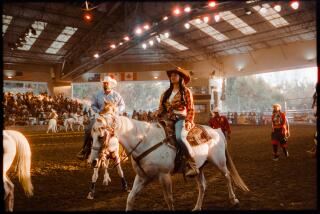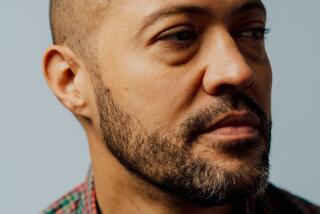Trip an Eye Opener for Black Pair
Tyrus Jefferson does not deny it. He competed in South Africa for the money.
As 1 of 14 U.S. track and field athletes who defied international regulations to compete in sports-isolated South Africa last month, Jefferson said he had no choice in the face of mounting bills.
As one of the United States’ up-and-coming long jumpers, Jefferson, 23, said he just wasn’t being supported by the American system.
“I finished third at the national championships,” he said. “At worst, I am the 13th-best jumper in the world and all I get is $175 a month to train. I can’t live off of that.”
Most of the athletes, including Jefferson, received $30,000 to $100,000 to compete in 3 meets in South Africa, the kind of payoff usually reserved for the stars of the track and field world.
“I was having a lot of financial problems, the kind of things a lot of people go through,” Jefferson said.
Jefferson, 15 hours shy of a communications degree at the University of Arkansas, said he needed the money for his education, his mother’s impending surgery and to help pay off a $2,500 loan that goes back to 1985, when he attended Long Beach City College.
Jefferson’s roommate on the 10-day tour, Milan Stewart of West Covina, is getting married, expecting a child and buying a house. He needed the money, too.
The two American black athletes, however, experienced a South Africa they had not bargained for when joining the tour.
They say the trip has made them politically aware, and they want to return to help promote black athletics.
For Jefferson, the division that threatens South Africa was embodied in one simple instance when a white tour guide pointed at some tinfoil shacks in a Cape Town township and said nonchalantly, “It’s warm in there.”
“She had a lot of nerve to say that,” said Jefferson, from Tyler, Tex.
Stewart, 1982 NCAA high hurdles champion at USC, said he and the six other black competitors on the tour had a special responsibility to support black South Africans.
“It was more important for me to see what was really going on, being black,” he said. “The whites on the tour didn’t really understand it. They’ve never walked down a street and been called a nigger. It was important to make sure that the blacks didn’t think we were selling out.”
Still, some think they did.
“If any black American saw how South Africa really was, they wouldn’t do anything to please the Pretoria government,” said Lisa Maree, wife of Sydney Maree, a South African middle distance runner who today is a U.S. citizen.
Colin Clarke, general secretary of the Cape Town-based African Council on Sport, an anti-apartheid organization, said the American blacks “make it doubly sickening for us. They enjoyed privileges which are not normally available to the majority of people in South Africa. They have been given honorary white status.”
Sydney Maree, cautious about criticizing South Africa because his family still lives there, became incensed when asked about Jefferson and Stewart.
“The last thing I need is a black American to tell me it is not so bad in South Africa,” he said. “They have shown me how ignorant they are. The tour wasn’t done to help blacks. No blacks were consulted or paid any money.”
Jefferson and Stewart, 28, say they are comfortable with their actions despite international condemnation and claims that their presence was a propaganda coup for the white minority government that perpetuates apartheid.
“If being used by the government helps blacks, it’s OK by me,” Stewart said.
By getting a first-hand experience, Jefferson and Stewart said, they understand the situation better and believe they can help.
“I’ve started something,” Stewart said. “These people are waiting for me to come back. People here have already passed judgment. Damn the brothers who went just to make money. But I’d go back for a plane ticket.
“We’re all against apartheid. Their government is not nice. But in time, it will change, just like it did in the U.S. I hope by running over there, it will enlighten people. I set a standard for the blacks of what can be accomplished.”
Whereas most of the U.S. athletes were accompanied by white security guards, Jefferson and Stewart roamed the country with South African blacks as guides. They went to the homes of blacks and colored, or mixed, and experienced the differences.
“It opened my eyes,” Stewart said. “If you stayed in the big towns, you wouldn’t know apartheid was there.”
Lisa Maree, an American black, recalled her first experience in the South African township of Atteridge near the Pretoria diamond mines where her husband grew up.
“You could experience the same thing in Bangladesh,” she said. “Where the blacks are living, they are living below the poverty line of black Americans. I was completely shocked at the number of people in such a small space, in matchbox homes. Some didn’t even have outhouses, just a hole in the ground.”
As the athletes learned more about the people, they earned respect, they said. Stewart said blacks would come up to him on the street and thank him for competing there. “I was a hero to them.”
But Lisa Maree said only a few of the blacks there are politically aware.
“When you are oppressed, you don’t even know it,” she said. “What did they expect, that the blacks would ask for political asylum right then and there? The blacks don’t know what is going on outside South Africa. The whites don’t even know what’s going on.”
But she also said that competing in South Africa comes down to an individual decision because the issues are not as clear-cut as some try to make them. Though she doesn’t believe the black athletes accomplished anything, she doesn’t think they did any harm.
Said Jefferson: “We never turned our backs on the blacks. We made an individual effort to reach out.”
The athletes gave impromptu clinics in the townships and Jefferson said he gave away his per-diem money to black children on the streets.
“That was something that the South Africa press never covered,” Stewart said.
Stewart wants to return to try to help young black athletes improve, but also to help place them in schools abroad. He and Jefferson say education is an important tool in developing the South African minorities. They view track as one avenue poor blacks can take to better themselves. “The way Sydney did,” Stewart said.
They want to set the standard for improvement by showing the blacks they should remain hopeful. And for this, they did not feel ashamed.
At a hearing Friday in Chicago, a panel of the Athletics Congress, the U.S. governing body for track and field, suspended indefinitely four of the participants in the South African tour, one of whom was Jefferson. The fate of the remaining participants will be decided at a hearing in December.
“I don’t care if I’m put on an anti-apartheid list by the United Nations or any other group,” Jefferson said. “I didn’t let my brothers down. I gave them everything I could.”
And, in the face of criticism, he will continue to hold his head up.
More to Read
Go beyond the scoreboard
Get the latest on L.A.'s teams in the daily Sports Report newsletter.
You may occasionally receive promotional content from the Los Angeles Times.






